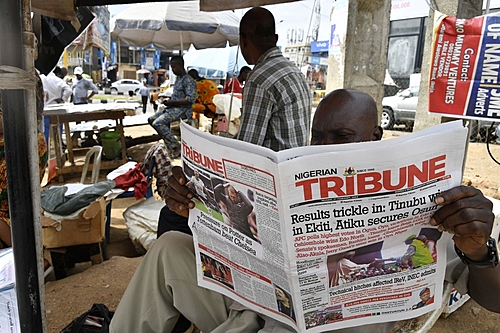
After more than 90 million voters in Nigeria were summoned to choose their new president and Parliament on Saturday (25), the counting continues, but there is still no outcome. One preliminary result, however, draws attention: candidate Peter Obi, from the Labor Party, won in Lagos, the most populous city in the country, defeating former governor of the region Bola Tinubu, from the Congress of All Progressives party.
With a campaign focused on the young population, Obi had 582 thousand votes in the region that was governed by Tinubu between 1999 and 2007. The candidate of the Congress of All Progressives registered 572 thousand votes in Lagos. The final result is still days away, after reports of delays in voting and queues that made it difficult to get to the polls.
For the new president to be chosen in just one round, the candidate must get 25% of the votes in at least 24 of the 36 states in the country. If no one reaches that mark, a second round will be necessary. Possession is scheduled for May 29, 2023.
In an interview with Brasil de Fato, the professor of international relations at the Federal University of ABC (UFABC), Mohammed Nadir, assesses that Obi achieved a “very significant victory” by beating Tinubu in his stronghold and that the Labor Party candidate can break the dominance of the two parties that have ruled Nigeria since 1999, when the military dictatorship ended: the Congress of All Progressives and the People’s Democratic Party, of presidential candidate Atiku Abubakar.
“It means a change [a vitória de Obi em Lagos]. For the first time that traditional division between North and South, between the big parties, let’s say, that dominated for several decades, and therefore this change, beyond religious and ethnic polarization, is heading towards a new type of elections”, says Nadir.
The population between 18 and 34 years old in the country represents 39.65% of voters and is the largest age group in the election, followed by the following groups: 35 to 49 years old (35.75%), 50 to 69 years old (18.94% ) and over 70 years old (5.66%). The data is from Independent National Electoral Commission. According to the US Census forecast, Nigeria will be the third most populous country in the world by 2045, behind only India and China.
Despite Nigeria being a major oil producer, information contained in a World Bank report indicates that 4 out of 10 Nigerians live below the poverty line. Statistics from Nigeria itself show that 33.3% of the population is unemployed.
The UFABC professor claims that Nigeria, despite being the most populous country in Africa and the largest economy on the continent, is a kind of “giant with feet of clay”, since most of its population cannot access wealth from its resources.
Peter Obi’s partial victory indicates, however, that the Labor Party candidate may succeed in “capturing the hearts and minds of a young, educated, urban Nigeria”.
Editing: Patricia de Matos
Source: www.brasildefato.com.br

